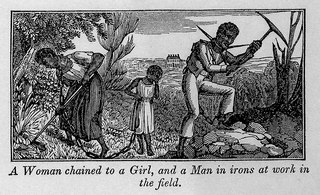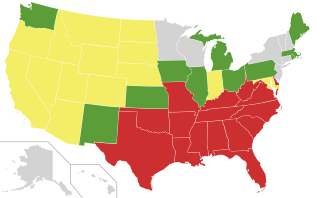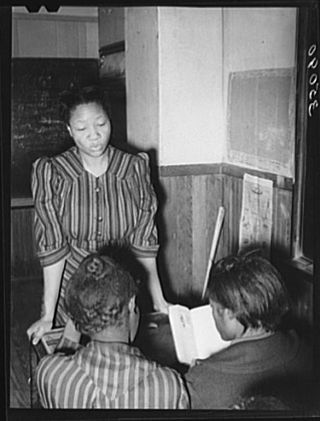Related Research Articles

The Atlantic slave trade or transatlantic slave trade involved the transportation by slave traders of enslaved African people, mainly to the Americas. The outfitted European slave ships of the slave trade regularly used the triangular trade route and its Middle Passage, and existed from the 16th to the 19th centuries. The vast majority of those who were transported in the transatlantic slave trade were people from Central and West Africa who had been sold by West African slave traders to mainly Portuguese, British, Spanish, Dutch, and French slave traders. while others had been captured directly by the slave traders in coastal raids; European slave traders gathered and imprisoned the enslaved at forts on the African coast and then brought them to the Americas. Except for the Portuguese, European slave traders generally did not participate in the raids because life expectancy for Europeans in sub-Saharan Africa was less than one year during the period of the slave trade.

Juneteenth is a federal holiday commemorating the end of slavery in the United States. Its name is a portmanteau of "June" and "nineteenth", as it is celebrated on the anniversary of June 19, 1865, when in the wake of the American Civil War, Major General Gordon Granger ordered the final enforcement of the Emancipation Proclamation in Texas. Originating in Galveston, Juneteenth has since been observed annually in various parts of the United States, often broadly celebrating African-American culture.
Reparations for slavery is the application of the concept of reparations to victims of slavery or their descendants. There are concepts for reparations in legal philosophy and reparations in transitional justice. In the US, reparations for slavery have been both given by legal ruling in court and/or given voluntarily by individuals and institutions.

From the first United States Congress in 1789 through the 116th Congress in 2020, 162 African Americans served in Congress. Meanwhile, the total number of all individuals who have served in Congress over that period is 12,348. Between 1789 and 2020, 152 have served in the House of Representatives, 9 have served in the Senate, and 1 has served in both chambers. Voting members have totaled 156, with 6 serving as delegates. Party membership has been, 131 Democrats, and 31 Republicans. While 13 members founded the Congressional Black Caucus in 1971 during the 92nd Congress, in the 116th Congress (2019-2020), 56 served, with 54 Democrats and 2 Republicans.

In the United States before 1865, a slave state was a state in which slavery and the internal or domestic slave trade were legal, while a free state was one in which they were prohibited. Between 1812 and 1850, it was considered by the slave states to be politically imperative that the number of free states not exceed the number of slave states, so new states were admitted in slave–free pairs. There were, nonetheless, some slaves in most free states up to the 1840 census, and the Fugitive Slave Act of 1850 specifically stated that a slave did not become free by entering a free state.
Racial equality is when people of all races and ethnicities are treated in an egalitarian/equal manner. Racial equality occurs when institutions give individuals legal, moral, and political rights. In present-day Western society, equality among races continues to become normative. Prior to the early 1960s, attaining equality was difficult for African, Asian, and Indigenous people. However, in more recent years, legislation is being passed ensuring that all individuals receive equal opportunities in treatment, education, employment, and other areas of life.

Public Law 103-150, informally known as the Apology Resolution, is a Joint Resolution of the U.S. Congress adopted in 1993 that "acknowledges that the overthrow of the Kingdom of Hawaii occurred with the active participation of agents and citizens of the United States and further acknowledges that the Native Hawaiian people never directly relinquished to the United States their claims to their inherent sovereignty as a people over their national lands, either through the Kingdom of Hawaii or through a plebiscite or referendum". The resolution has been cited as impetus for the Hawaiian sovereignty movement, and has been the subject of debate.

African American history started with the arrival Africans to North America in the 16th and 17th centuries. Former Spanish slaves who had been freed by Francis Drake arrived aboard the Golden Hind at New Albion in California in 1579. The European colonization of the Americas, and the resulting transatlantic slave trade, led to a large-scale transportation of enslaved Africans across the Atlantic; of the roughly 10–12 million Africans who were sold by the Barbary slave trade, either to European slavery or to servitude in the Americas, approximately 388,000 landed in North America. After arriving in various European colonies in North America, the enslaved Africans were sold to white colonists, primarily to work on cash crop plantations. A group of enslaved Africans arrived in the English colony of Virginia in 1619, marking the beginning of slavery in the colonial history of the United States; by 1776, roughly 20% of the British North American population was of African descent, both free and enslaved.

The Dyer Anti-Lynching Bill (1918) was first introduced in the 65th United States Congress by Representative Leonidas C. Dyer, a Republican from St. Louis, Missouri, in the United States House of Representatives as H.R. 11279 in order “to protect citizens of the United States against lynching in default of protection by the States.” It was intended to establish lynching as a federal crime. The Dyer Anti-Lynching Bill was re-introduced in subsequent sessions of United States Congress and passed, 230 to 119, by the House of Representatives on January 26, 1922, but its passage was halted in the United States Senate by a filibuster by Southern Democrats, who formed a powerful block. Southern Democrats justified their opposition to the bill by arguing that lynchings were a response to rapes and proclaiming that lynchings were an issue that should be left for states to deal with.
This is a timeline of African-American history, the part of history that deals with African Americans.
In societies that regard some races or ethnic groups of people as dominant or superior and others as subordinate or inferior, hypodescent refers to the automatic assignment of children of a mixed union to the subordinate group. The opposite practice is hyperdescent, in which children are assigned to the race that is considered dominant or superior.
The Jim Crow laws were state and local laws introduced in the Southern United States in the late 19th and early 20th centuries that enforced racial segregation, "Jim Crow" being a pejorative term for an African-American. Such laws remained in force until 1965. Formal and informal segregation policies were present in other areas of the United States as well, even if several states outside the South had banned discrimination in public accommodations and voting. Southern laws were enacted by white Southern Democrat-dominated state legislatures to disenfranchise and remove political and economic gains made by African Americans during the Reconstruction era. Such continuing racial segregation was also supported by the successful Lily-White Movement of Southern Republicans.

In the United States, anti-miscegenation laws were passed by most states to prohibit interracial marriage, and in some cases also prohibit interracial sexual relations. Some such laws predate the establishment of the United States, some dating to the later 17th or early 18th century, a century or more after the complete racialization of slavery. Nine states never enacted such laws; 25 states had repealed their laws by 1967, when the United States Supreme Court ruled in Loving v. Virginia that such laws were unconstitutional in the remaining 16 states. The term miscegenation was first used in 1863, during the American Civil War, by journalists to discredit the abolitionist movement by stirring up debate over the prospect of interracial marriage after the abolition of slavery.

Reparations for slavery is the application of the concept of reparations to victims of slavery and/or their descendants. There are concepts for reparations in legal philosophy and reparations in transitional justice. Reparations can take many forms, including practical assistance to the descendants of enslaved people, acknowledgements or apologies to peoples or nations negatively affected by slavery, or honouring the memories of people who were enslaved by naming things after them.

African-American teachers educated African Americans and taught each other to read during slavery in the South. People who were enslaved ran small schools in secret, since teaching those enslaved to read was a crime. Meanwhile, in the North, African Americans worked alongside Whites. Many privileged African Americans in the North wanted their children taught with White children, and were pro-integration. The Black middle class preferred segregation. During the post-Reconstruction era African Americans built their own schools so they did not have White control. The Black middle class believed that it could provide quality education for their community. This resulted in the foundation of teaching as a profession for Blacks. Some Black families had multiple individuals who dedicated their lives to teaching. They felt that they could empower their communities. In the late 19th and early 20th centuries, Southern States passed Jim Crow laws to mandate racial segregation in all aspects of society, and prevent Blacks from voting. Racism made it difficult for Black professionals to work in other professions. In 1950, African American teachers made up about half of African-American professionals.

Black Southerners are African Americans living in the Southern United States, the United States region with the largest black population.
Civil rights in the United States include noted legislation and organized efforts to abolish public and private acts of racial discrimination against Native Americans, African Americans, Asians, Latin Americans, women, the homeless, minority religions, and other groups since the independence of the country.
Black Kentuckians are residents of the state of Kentucky who are of African ancestry. The history of Blacks in the US state of Kentucky starts at the same time as the history of White Americans; Black Americans settled Kentucky alongside white explorers such as Daniel Boone. As of 2019, according to the U.S. Census Bureau, African Americans make up 8.5% of Kentucky's population. Compared to the rest of the population, the African American census racial category is the 2nd largest.

In the context of racism in the United States, racism against African Americans dates back to the colonial era, and it continues to be a persistent issue in American society in the 21st century.
References
- ↑ O'Dell, Larry (February 25, 2007). "Virginia Apologizes for Role in Slavery". The Washington Post.
- ↑ "Florida apologizes for role in slavery". Tampa Bay Times. Archived from the original on August 10, 2017. Retrieved August 28, 2017.
- ↑ "House apologizes for slavery, 'Jim Crow' injustices – CNN.com". www.cnn.com. CNN. Retrieved 21 September 2019.
- ↑ Cohen, Steve (29 July 2008). "H.Res.194 – 110th Congress (2007–2008): Apologizing for the enslavement and racial segregation of African-Americans". www.congress.gov. Retrieved 21 September 2019.
- ↑ "Apologizing for the enslavement and racial segregation of African-Americans. (2008 – H.Res. 194)". GovTrack.us.
- ↑ "H. Res. 194: Apologizing for the enslavement and racial segregation of African-Americans" (PDF). Retrieved 21 September 2019.
- ↑ "Congress Apologizes for Slavery, Jim Crow". NPR.org. Retrieved 2022-12-29.
- ↑ "Barack Obama praises Senate slavery apology". www.telegraph.co.uk. Retrieved 2022-12-29.
- ↑ Thompson, Krissah (June 19, 2009). "Senate Backs Apology for Slavery". The Washington Post. Retrieved June 21, 2009.